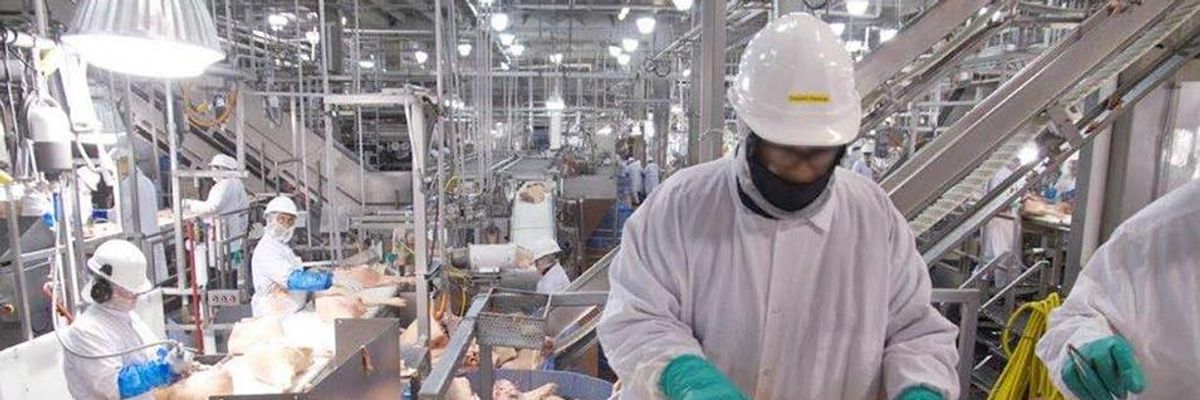Documents obtained from the United States Department of Agriculture by the consumer advocacy group Public Citizen and published Wednesday reveal how leading players in the meatpacking industry--one of the hardest-hit by the coronavirus pandemic--fought the minimal efforts imposed by the Trump administration to prevent the spread of Covid-19 in meat processing plants last spring.
As Public Citizen put it, "these docs are utterly damning."
Responding to Public Citizen's Freedom of Information Act (FOIA) request, the USDA handed over documents (pdf) showing that:
- In April 2020, officials in the North American Meat Institute protested USDA's decision not to send Food Safety and Inspection Service (FSIS) inspectors who were exposed to Covid-19 into other plants. On April 15, 2020, one NAMI official stated that "we can't start sidelining individuals at FSIS or in the industry because they may have been exposed. We all may have been exposed at this point";
- Later in April 2020, officials at the National Chicken Council complained to USDA that FSIS was asking too many questions about Covid-19 testing at poultry processing facilities, stating the "questions seem to be unnecessary."
- In May 2020, officials at animal processing giant Tyson Foods complained to USDA that the company had to "spend significant resources... each day when reporting positive team members."
- In March 2020, the Food and Beverage Issue Alliance developed guidance for industry members stating that, unless state or local governments required it, "physical (social) distancing should be a tool but not a requirement."
- Industry officials reported FSIS employees who warned their friends and families about plants with cases of Covid-19, specifically forwarding a personal Facebook post and asking USDA to take disciplinary action against the inspectors.
Adam Pulver, an attorney at the Public Citizen Litigation Group, said in a statement that "it is heartbreaking to see the callousness of the meatpacking industry, pushing back against basic safety measures that could have saved hundreds of lives and helped contain the Covid-19 pandemic."
"While we knew that meatpacking companies did not take adequate measures to protect their workers and the communities they lived in from the threat of Covid-19, these documents show that the industry actively pushed back against the few steps the Trump administration took to try to ensure the safety of meatpacking workers and federal inspectors," Pulver added.
As Public Citizen notes, at least 45,000 coronavirus cases and 240 Covid-19 deaths have been linked to U.S. meatpacking facilities.
In September 2020, Public Citizen and American Oversight published documents also obtained via FOIA requests that showed how the USDA and the meatpacking industry worked together to downplay and disregard risks to worker health during the pandemic. The documents revealed that a leading meat industry lobby group drafted a proposed executive order that was strikingly similar to a directive issued a week later by then-President Donald Trump to keep meatpacking plants open against the orders of local health officials.
Last September's revelations were followed by a November scandal involving supervisors at a Tyson Foods plant in Waterloo, Iowa who placed cash bets on how many workers at the facility would contract the coronavirus. More than 1,000 employees--over a third of the plant's workforce--were infected.

